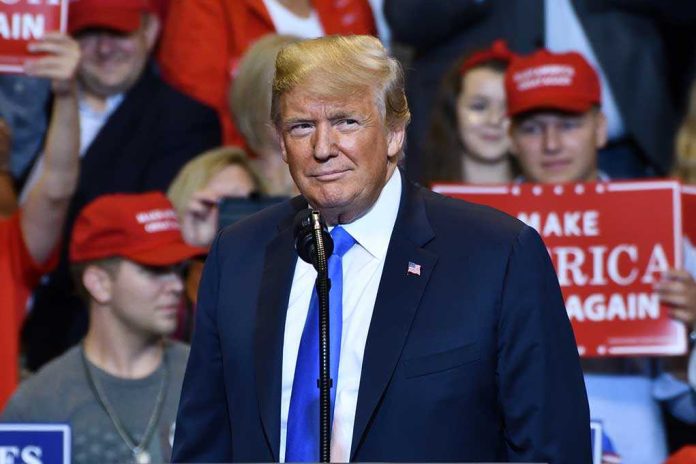
President Trump’s decisive halt to Ukraine weapons shipments marks a turning point in the conflict as the Kremlin declares fewer arms will bring a faster end to hostilities.
Key Takeaways
- The White House has suspended shipments of key weapons systems to Ukraine including Patriot air defense missiles and artillery rounds, prioritizing U.S. military readiness
- Kremlin spokesman Dmitry Peskov welcomed the reduction, claiming fewer weapons deliveries will accelerate the end of what Russia calls its “special military operation”
- Ukrainian officials warn that halting U.S. weapons shipments will only encourage Russia to prolong the conflict and strengthen its position
- The Pentagon’s decision reflects growing concerns about depleted U.S. military stockpiles and readiness for potential conflicts elsewhere, particularly with China
- Russia currently controls approximately 20% of Ukrainian territory and has made recent territorial advances as weapons deliveries slow
Trump Administration Shifts Military Aid Policy
President Trump’s administration has implemented a significant policy shift regarding military aid to Ukraine, halting shipments of critical weapons systems that had been promised by the previous administration. The suspended shipments include Patriot air defense missiles, 155-millimeter artillery rounds, GMLR missiles, Stinger missiles, and Hellfire missiles – all crucial components of Ukraine’s defense strategy against Russian forces. This decision follows a comprehensive Department of Defense review aimed at reassessing America’s global military commitments and prioritizing U.S. national security interests.
Deputy White House Press Secretary Anna Kelly explained the administration’s position, stating: “This decision was made to put America’s interests first following a Department of Defense review of our nation’s military support and assistance to other countries across the globe. The strength of the United States armed forces remains unquestioned. Just ask Iran.” The policy shift represents a sharp departure from the previous approach, which had channeled tens of billions of dollars in military aid to Ukraine since the conflict began in February 2022.
The decision reflects mounting concerns within the Pentagon and among military strategists about America’s military readiness, particularly regarding potential conflicts with China. Defense officials have grown increasingly worried about depleted U.S. weapons stockpiles and manufacturing capacity after more than two years of extensive support to Ukraine. The administration’s position appears to prioritize rebuilding American military capabilities while reassessing the strategic value and sustainability of continued large-scale weapons transfers to Ukraine.
Moscow’s View: Fewer Weapons Means Faster Resolution
Russian officials have promptly welcomed the Trump administration’s decision to withhold weapons from Ukraine, framing it as a step toward ending the conflict. The Kremlin’s position directly links the flow of Western weapons to the duration of what it consistently refers to as its “special military operation” in Ukraine. This terminology reflects Russia’s refusal to acknowledge the conflict as a full-scale war or invasion, despite controlling approximately 20% of Ukrainian territory and continuing to make territorial advances in recent months.
“The fewer the number of weapons that are delivered to Ukraine, the closer the end of the special military operation,” stated Kremlin spokesman Dmitry Peskov. This perspective aligns with Russia’s consistent narrative that Western military support merely prolongs the conflict rather than helping to resolve it. From Moscow’s viewpoint, reducing weapons deliveries creates leverage that could force Ukraine toward accepting terms more favorable to Russian interests.
Ukrainian Response and Military Implications
Ukrainian officials have responded with alarm to the news of suspended weapons shipments, warning that such actions will only embolden Russia rather than facilitate peace. Ukraine’s foreign ministry has emphasized the critical need for strengthened air defenses to counter ongoing Russian missile and drone attacks against civilian infrastructure. Without a steady supply of air defense systems like the Patriot missiles now being withheld, Ukraine’s ability to protect its cities and critical infrastructure becomes severely compromised.
“The United States not sending those particular weapons systems will have a tactical effect on the battlefield. But, really, the effect is more on the will and morale of the Ukrainian people. If you want to negotiate a peace settlement, it’s always better to negotiate from a position of strength. And that position of strength comes by continuing for the United States and our Western allies to supply arms, aid, and material to the Ukrainians so they can continue to fight this illegal aggression,” said Maj. Gen. David Baldwin (Ret.).
The reduced weapons flow comes at a critical juncture when Russian forces have been making territorial gains in eastern Ukraine. Military analysts suggest that without a consistent resupply of ammunition and advanced systems, Ukraine’s defensive capabilities will steadily deteriorate, potentially accelerating Russian advances. The impact will be particularly severe in high-intensity combat zones where artillery shells and precision munitions are consumed at extraordinary rates. Ukrainian forces already report ammunition rationing in some sectors, forcing tactical adjustments that often cede the initiative to Russian forces.
Strategic Considerations and Future Outlook
The shift in U.S. policy reflects broader strategic considerations beyond the immediate Ukraine conflict. The Pentagon’s prioritization of military readiness for potential confrontation with China represents a significant reorientation of American defense posture. This reprioritization acknowledges the limits of American manufacturing capacity and defense stockpiles, issues that have become increasingly apparent as the Ukraine conflict has continued to consume massive quantities of munitions and equipment.
“They’re not quite ready, and they’re certainly not ready to start producing super sophisticated weapons systems like Patriots. The answer is unfortunately, a tough one for the United States government. I would recommend that they continue to support the Ukrainians, because that fight is happening right now. That’s a fight against tyranny right now, while we continue to tool up our defense industry and spend more money to increase our capacity to build capacity to later face the Chinese,” stated Maj. Gen. David Baldwin (Ret.).
The European response to America’s policy shift remains uncertain. While European allies have provided significant military aid to Ukraine, many face their stockpile limitations and domestic political constraints. Czech President Petr Pavel, who previously served as Chair of NATO’s Military Committee, expressed uncertainty about continued support, saying, “I don’t know what will be the priorities of a new government.” This uncertainty across NATO partners further complicates Ukraine’s strategic outlook and ability to sustain its defense against ongoing Russian operations.



